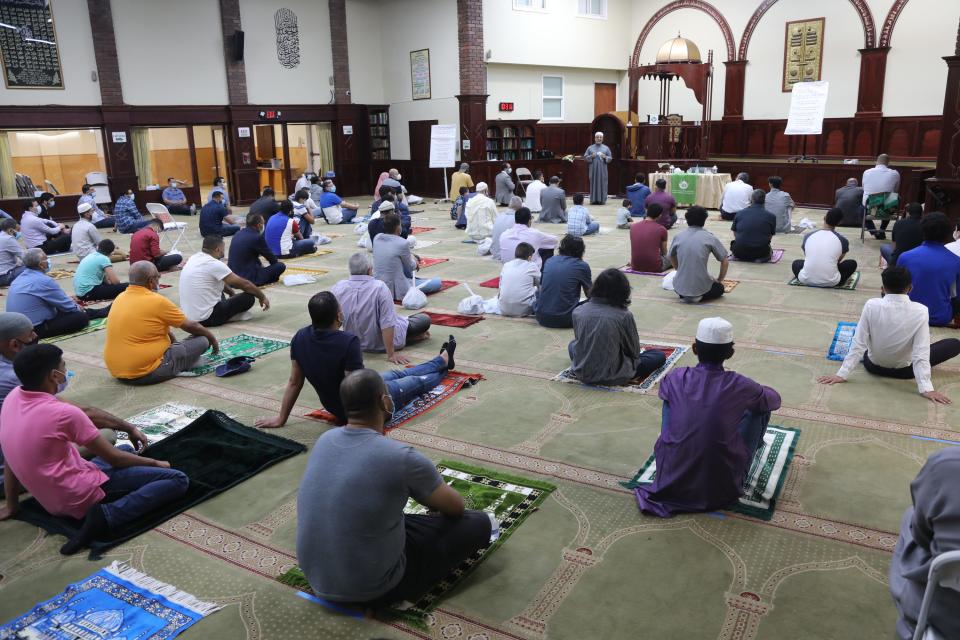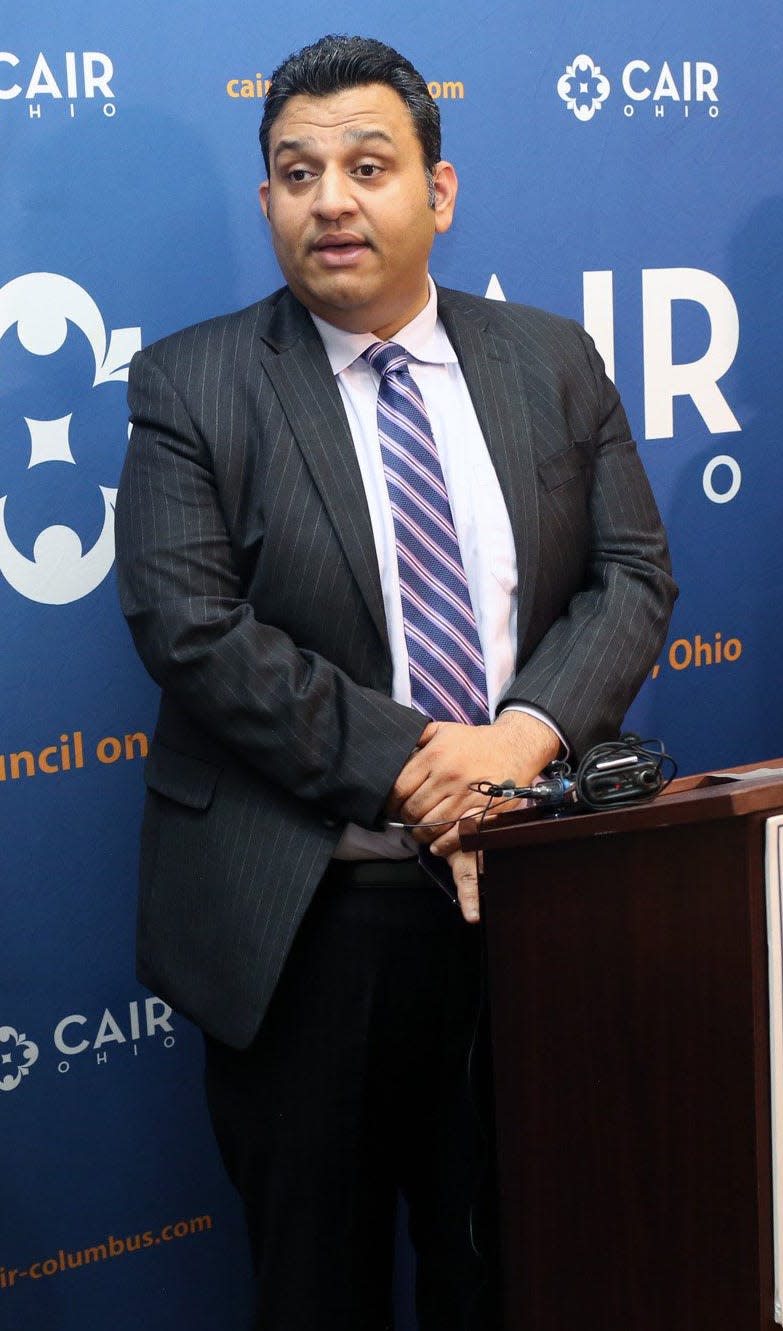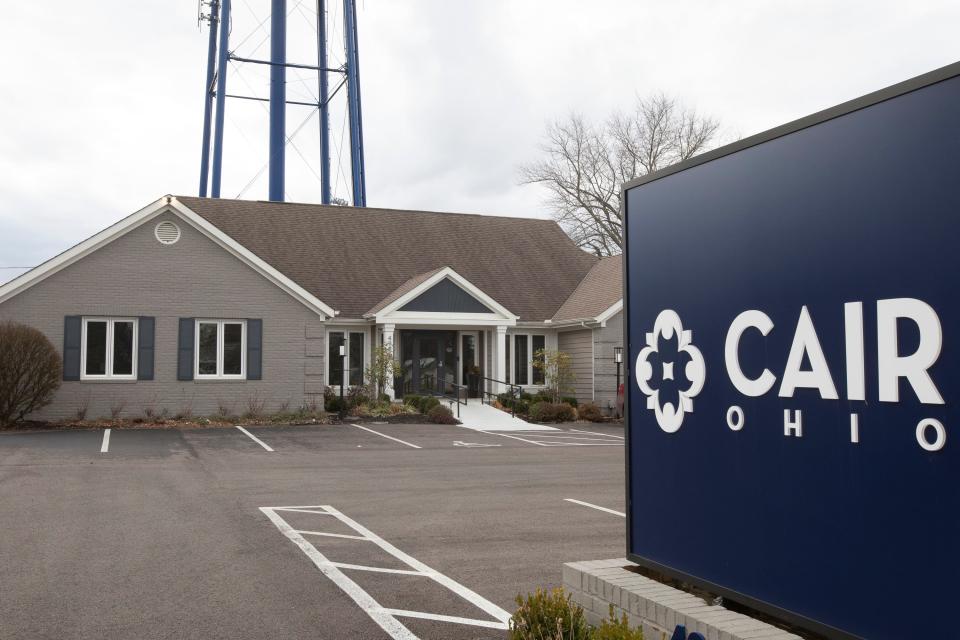For NJ Muslims, new spying scandal comes as no surprise after years of surveillance
- Oops!Something went wrong.Please try again later.
Ten years after revelations of an extensive NYPD spying operation in their communities, Muslim Americans have once again found themselves the target of secret surveillance.
The news in recent weeks has centered on the Investigative Project on Terrorism, a nonprofit research group that critics say has an anti-Muslim bias. In December, a Muslim civil rights organization accused the group of bankrolling a years-long effort using staff and paid informants to monitor Muslim leaders, including a leading New Jersey imam.
The most prominent fallout came in Ohio, where the head of the state chapter of the Council on American-Islamic Relations was fired, after allegedly serving as an IPT mole for more than a decade.
CAIR subsequently released a statement showing other reported targets, including Imam Mohammad Qatanani of the Islamic Center of Passaic County in Paterson, one of the Garden State's largest mosques. New York attorney and Palestinian rights activist Lamis Deek and Minnesota Attorney General Keith Ellison also came under scrutiny, along with other Muslim leaders, according to statements from a whistleblower and an informant.

“As far as we can see, IPT at one point or another touched pretty much every major Muslim organization in the U.S.,” said Edward Ahmed Mitchell, the deputy director of CAIR, one of the nation's most high-profile Muslim advocacy groups. “Their main target was the national Muslim community and anything that was in any way connected to public affairs and foreign policy.”
For Muslims, the news was a chilling reminder of aggressive law enforcement surveillance they faced after the Sept. 11 attacks. But it also underscored what many already knew: that anti-Muslim groups were watching them, too — tracking, documenting and trying to find dirt on the community.
While the NYPD cast a wide net in its monitoring — mapping, eavesdropping and photographing at mosques, businesses and schools in New York and New Jersey — IPT's focus was on Muslims in positions of prominence or power, Mitchell said.
“Their goal was to undermine Muslims to make sure Muslims would never become a powerful force in this country,” he said.
Surveillance group: What is the Investigative Project on Terrorism, and who is its founder Steve Emerson?
IPT and its founder, Steve Emerson, a former journalist and television pundit, denied allegations of widespread surveillance in a response emailed to The Record and the USA TODAY Network.
“IPT has never monitored and will never monitor the wider American Muslim community. But the IPT will not hesitate to uncover and publicly expose radical Islamist activity on American soil by groups like CAIR, which threaten our national security,” the organization wrote.
“IPT has been helped in its work by Muslims who share IPT’s awareness of the threats posed by radical Islamists and who do not in any way represent the views of the vast majority of American Muslims."
‘Third person sitting in the room'
The scandal broke in mid-December when CAIR announced that the executive and legal director of its Ohio chapter, Romin Iqbal, had been giving IPT confidential information about the group, including recordings of conversations, strategic plans and private emails. Since then, CAIR has released statements from a mosque volunteer from Virginia and a former IPT staffer admitting their parts in the operation.
CAIR said it was tipped off by a whistleblower to Iqbal's spying in Ohio. The group released an anonymous statement on Jan. 12 in which the whistleblower said he prepared “summaries and transcripts of recordings of events and conversations that frequently included Muslim leaders."
He also recorded video and audio at mosques, rallies and other public events in the tri-state area, listing Qatanani among his targets in the statement. He did not explain his activity there, but CAIR said it took place a decade ago.
Progress? Next NJ Legislature may include two Muslims, and author of anti-Islam posts
Nadia Kahf, chairwoman of the Paterson center, said she was not surprised by the news because of reports that have emerged over the years about informants at mosques and activist groups.
“At ICPC, we always joked around that there is a third person sitting in the room with us,” she said. "The community is aware there are people who may be praying next to them that may be relaying information to others.”

The Islamic Center, which also has a branch in Clifton, has for years streamed live sermons and events online, and Qatanani noted he was a key figure in interfaith groups and law enforcement advisory groups.
“We are very open and we don’t have anything to hide,” the imam said in an interview.
The whistleblower watched Qatanani around the time immigration authorities were trying to deport him. In 2006, U.S. officials alleged he didn't disclose a 1993 arrest and conviction in Israel for giving support to Hamas, which the U.S. has classified a terrorist organization.
In court, Qatanani said that he was detained but was never told of any charges or convictions and never saw a judge. He was never a member of Hamas, he testified, and other witnesses said detentions were routine at the time. A judge found no credible evidence of a conviction and ruled in Qatanani's favor in 2008.
The case drew widespread attention as clergy, law enforcement and elected officials defended Qatanani in court as a respected leader and bridge builder.
While comments were compiled from rallies and mosque sermons, there is no indication that the information was illegally obtained. But in Ohio, CAIR leaders say, surveillance was covert and possibly illegal.
After the whistleblower came forward, CAIR hired a law firm and forensic expert who found that Iqbal had been sharing emails and secret recordings of meetings held with other chapters and organizations for at least 13 years.
What is CAIR?: Despite criticisms, CAIR controversial only to vocal few, its leaders say
Iqbal confessed but has not said why he spied, according to CAIR officials. After he was fired, CAIR said Tariq Nelson of Virginia had also come forward to say he worked for IPT for four years starting in 2008, receiving $3,000 a month to gather information. In a statement released by CAIR, Nelson said he now wants "to right the wrong that I did."

Like Iqbal, he recorded public and private events with prominent leaders and organizations. That included a call with a dozen groups about a proposed Islamic center near ground zero in Manhattan and a 2010 fundraiser at a private home with Keith Ellison, then a U.S. congressman and the first Muslim elected to Congress.
Ellison's campaign to lead the Democratic National Committee was derailed by the release of the recording, in which he complained that U.S. Middle East policy was too tied to Israel and ignored other interests in the region.
In its statement, IPT said its work was intended to expose "radical Islamists." The group said Nelson attended a Virginia mosque where individuals had been suspected of terrorist financing. IPT also alleged that CAIR supports Hamas, an accusation that the organization has refuted.
A history of surveillance
Surveillance of Muslim groups stretches back well before 9/11, said Kameelah Mu’Min Rashad, a board member for Muslim Advocates, another advocacy group recorded by Iqbal.
“As a child growing up in Brooklyn in the 1980s, I can recall conversations about the presence of federal agents or other operatives in the masjid,” she said, using the Arabic word for mosque.
The FBI targeted civil rights activists and Black nationalists, including Muslims, under a wider effort called Operation COINTELPRO between 1956 and 1971. The agency would go on to monitor nonprofits, student groups in mosques in Chicago, in a terrorist money laundering probe recently described in the documentary "The Feeling of Being Watched," which called it the biggest domestic terror investigation before 9/11.
After 9/11, the NYPD conducted sweeping surveillance at businesses, schools and mosques within 100 miles of New York City, including in New Jersey. Their efforts failed to generate any leads or investigations, officials later acknowledged as part of a civil rights lawsuit brought by Muslim citizens.
Recent decades also saw a rise of private research groups dedicated to tracking and documenting statements and activities by Muslim activists, professors and other public figures, trying to link them to radical groups or sentiments.
"It's a reflection of what law enforcement has been doing, [for instance] the NYPD police commissioner getting weekly speaker lists at Muslim student organizations," said Faiza Patel of the Brennan Center for Justice, a nonprofit law and public policy institute at New York University School of Law.
The trend is "driven by technology. It's much easier to track what people say and do," said Patel, co-director of the school's Liberty and National Security program.

Kahf, of the Paterson center, who is also a board member of CAIR’s New Jersey chapter, said people had given information in the past to an “Islamophobic network." In one such case in 2008, CAIR hired intern Chris Gaubatz, who used a fake name to gain access and help his father research a book that claimed a conspiracy to "Islamize America."
Gaubatz stole 12,000 documents, including budget reports, real estate records, strategy papers and bank statements, CAIR said in a still-pending lawsuit. He also made video and audio recordings of private meetings and conversations involving CAIR officials and employees, the suit said.
Some documents were shared online or in the book, as were names, addresses, phone numbers and emails of former CAIR employees and donors.
Muslim leaders say the scrutiny has made some people wary of donating to charities or expressing political opinions, fearing they will end up named in an investigation or targeted on a far-right website.
What is IPT?
Founded in 1995, IPT bills itself as a counterterrorism institute and data center. After 9/11, Emerson became a frequent cable-news guest and testified before Congress. But he faced allegations of inaccuracies and conspiracy-mongering, including claims that radical Muslims were infiltrating Congress and the White House.
In New Jersey, he railed against Sohail Mohammed in 2011, when he was appointed a state Superior Court judge by then-Gov. Chris Christie. Emerson wrote online that Mohammed was a “longtime mouthpiece for radical Islamists" and that Christie, who has also spoken highly of Qatanani, "has a tin ear for radical Islam."
The whistleblower who outed Iqbal said he joined IPT after 9/11 because he believed in its mission of fighting terrorism. Instead, much of his work was focused on “surveilling critics of Israel,” the person said in his statement.
"We were essentially being used as an Israel lobbying organization,” he said.
The former staffer provided screenshots of emails to CAIR allegedly showing that Emerson was exchanging information with Israeli officials, including a 2014 message asking for any information that might link Students for Justice in Palestine to Hamas. Emerson said he would send reports on the college activist group, but had not found a "smoking gun" showing a connection.
Asked about the emails, IPT responded that neither "Mr. Emerson nor the IPT has ever worked at the direction of any government, foreign or domestic."
CAIR has called for an FBI investigation into IPT's activities, but the agency has so far declined to comment.
In recent weeks, CAIR National Executive Director Nihad Awad has cautioned chapters to be vigilant about security and take precautions when they hire people. But he said average Muslim Americans "should not become concerned or paranoid."
"We're not doing anything that needs to be hidden," he said.
Hannan Adely is a diversity reporter covering Arab and Muslim communities for NorthJersey.com, where she focuses on social issues, politics, bias and civil rights. To get unlimited access to the latest news, please subscribe or activate your digital account today.
Email: adely@northjersey.com
Twitter: @adelyreporter
This article originally appeared on NorthJersey.com: CAIR spying scandal: Surveillance fears for NJ Muslims

